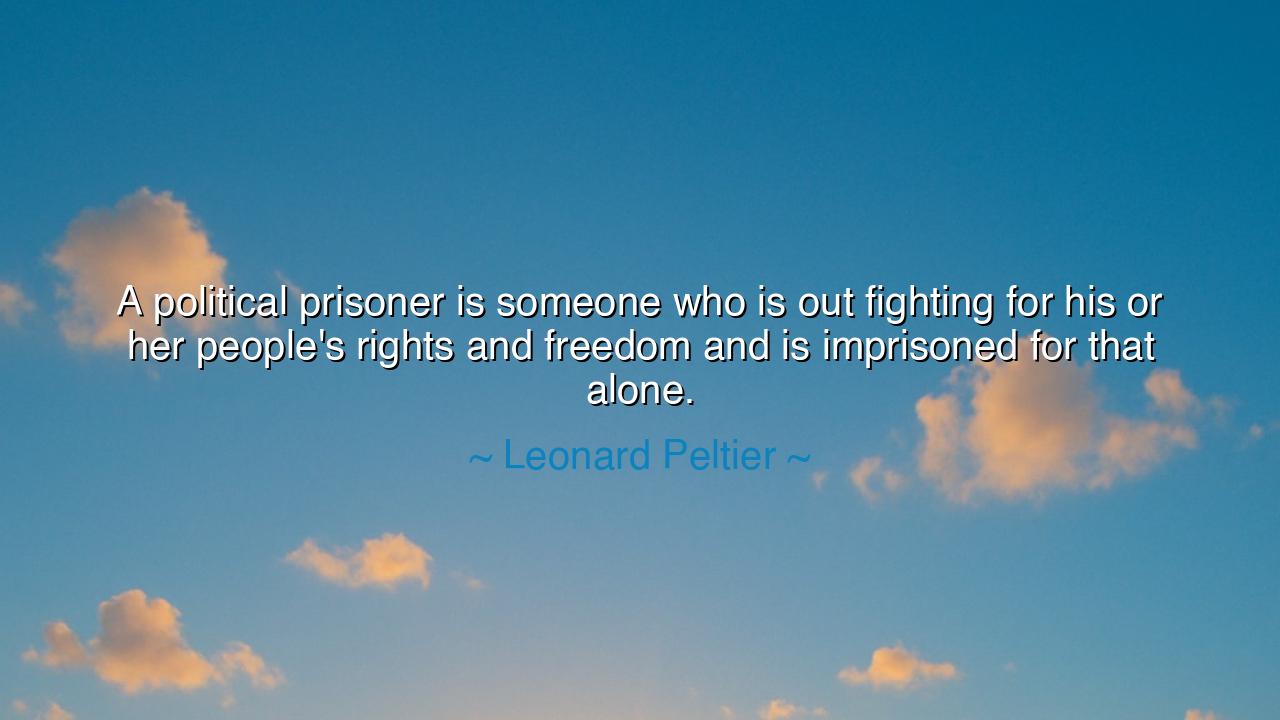
A political prisoner is someone who is out fighting for his or
A political prisoner is someone who is out fighting for his or her people's rights and freedom and is imprisoned for that alone.






When Leonard Peltier declared, “A political prisoner is someone who is out fighting for his or her people's rights and freedom and is imprisoned for that alone,” he was not speaking from the safety of philosophy, but from the depth of experience — from behind the cold iron bars of captivity. His words rise not as theory but as testimony, forged in the long night of injustice. They are the cry of a warrior whose chains could not silence his purpose. In this single sentence, Peltier reveals the essence of sacrifice: that the struggle for freedom often demands the highest price, and that those who carry the burden of truth are too often made to suffer for it.
Born of the Lakota and Anishinaabe peoples, Peltier became a symbol of Native resistance and resilience. In the 1970s, amid the fire and fear of the American Indian Movement, he stood as a defender of his people’s land, dignity, and sovereignty. His imprisonment, one of the most controversial in modern history, transformed him into a living embodiment of his own words. To him, a political prisoner is not merely someone who breaks the law, but one who is punished because he dared to stand against oppression. His definition cuts through illusion: when power fears truth, it imprisons the truth-tellers. When tyranny trembles, it calls justice rebellion.
Peltier’s words reach back to the dawn of human civilization, for every age has known such prisoners — men and women who refused to bow before injustice. Socrates, condemned by Athens for corrupting the youth, drank the hemlock rather than renounce his teachings. Nelson Mandela, locked in a South African cell for twenty-seven years, emerged unbroken, his chains transformed into symbols of victory. And Mahatma Gandhi, imprisoned for his nonviolent resistance, taught the world that even a captive soul can shake an empire. These were not criminals — they were voices of conscience, punished not for their crimes, but for their courage. Their imprisonment was not a defeat, but a mirror reflecting the moral sickness of the societies that bound them.
Thus, when Peltier says a political prisoner is one who “is imprisoned for that alone,” he names the tragic paradox of freedom — that those who love it most are often those who are denied it. Power fears those who awaken others, for truth is more dangerous than weapons. To speak against injustice is to threaten the order built upon it, and so, the truth-teller becomes the target, the rebel becomes the prisoner, the just man becomes the outcast. Yet in this inversion lies a deeper truth: the prison of the body cannot contain the freedom of the soul. The one who fights for his people carries within him the light of something eternal, and that light cannot be confined by walls.
Peltier’s own endurance reminds us that resistance and suffering are bound together, as night and dawn. He has spent decades in captivity, yet his spirit has not bowed. His words echo the wisdom of the ancients — that every act of courage plants a seed, even in stone. The oppressor may claim victory in the moment, but time always bends toward justice. As Mandela once said, “No power on earth can stop an oppressed people determined to win their freedom.” Peltier’s story stands as part of this sacred lineage — the lineage of those who suffer not for themselves, but for the dignity of their people.
We must also understand that his teaching is not limited to one man, one people, or one time. Across the world, countless souls have been silenced, exiled, or imprisoned because they stood for truth — journalists who spoke against tyranny, artists who exposed lies, citizens who refused to surrender their voices. Each of them is a political prisoner in the sense Peltier describes. Their captivity is a reminder of the cost of liberty, and of the duty borne by those who still walk free: to remember them, to speak their names, and to continue the struggle they began.
So, my children, learn from this: freedom is never a gift — it is a responsibility. Those who fight for it do so not because it is easy, but because it is sacred. And when such men and women are imprisoned, their spirit becomes our inheritance. Do not turn away from their struggle. Honor them by living with courage, by speaking truth even when silence is safer, by standing for the rights of others even when your own are secure. For the chain that binds one man, if left unbroken, will one day reach for us all.
Remember, then, the wisdom of Leonard Peltier: “A political prisoner is someone who is out fighting for his or her people’s rights and freedom and is imprisoned for that alone.” In these words lies the eternal flame of resistance — the reminder that justice is born of courage, and that those who suffer for others do not suffer in vain. Their bodies may be confined, but their spirits walk free — and it is through their endurance that humanity itself continues its long, unending march toward the dawn of freedom.






AAdministratorAdministrator
Welcome, honored guests. Please leave a comment, we will respond soon